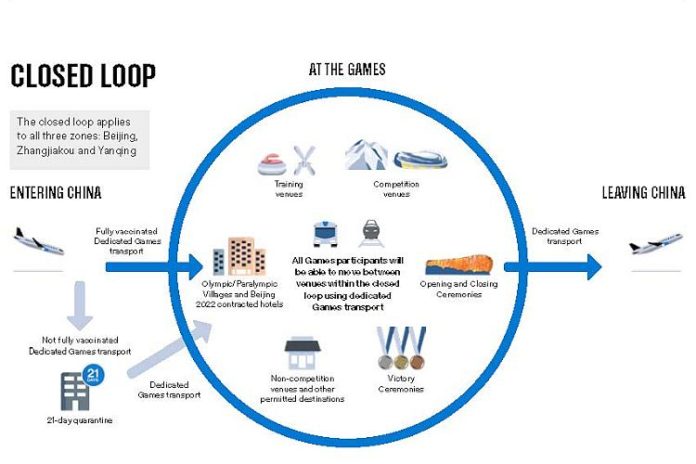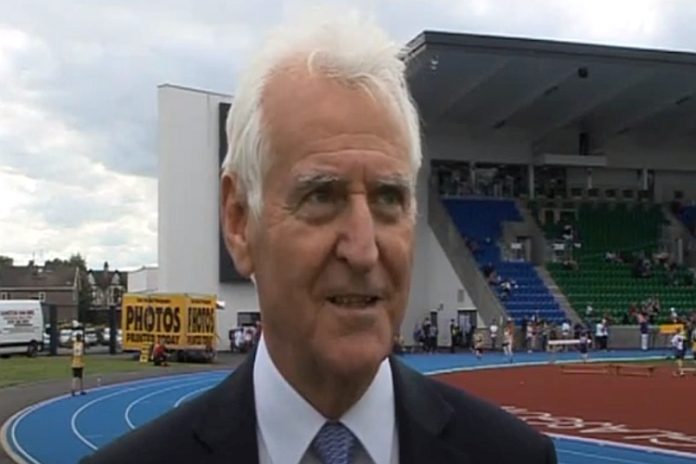“When it comes to outbreaks in China and the closed-loop approach, it is a closed loop for that very reason. It means there will be no contact between people outside the loop, and inside the loop, it has been built to protect the population inside and also the population outside.
“Should there be any outbreaks, and for now they are different prefectures, we are very well protected inside the loop for the very reason that they cannot be direct contact between the two entities so there is no concern from this perspective that this could influence the Games.”
That was Pierre Ducrey (SUI), the International Olympic Committee’s Olympic Games Operations Director, answering questions earlier today from Beijing concerning the forthcoming Olympic Winter Games, scheduled to open on 4 February.
Most of the questions were about Covid and the Games, and the “closed-loop system,” the Chinese version of a “bubble” to separate the Games participants from the rest of the country. Asked about his confidence in the Chinese approach, Ducrey stated with confidence:
“The loop … is meant to keep completely separated, the Chinese residents, or people living outside of the loop from the people inside the loop. So, for them, the possibility to interact with us is not existing. So I think everybody is reassured regarding that fact.”
Ducrey was asked about the overall preparation of the organizers for the Games:
“[W]e are pleased to see things are well in order. We are conducting a number of traditional activities at this stage: venue visits, venue walk-throughs with a number of experts, with the International Federations also and we can confirm the impression that we had from the test events, which is that the field of play and the venues are outstanding. So, we’re going to have fantastic sport here in Beijing.
“The Villages also look fantastic. As planned, they will pre-open on the 23rd of January and open on the 27th officially. …
“I think everybody here on the ground is very impressed with what we have seen, from the quality of the venues that I mentioned before, the quality of the services, the quality of the welcome, as well. We have a lot of people here which are very welcoming, very keen to work with us and as I mentioned earlier also, very impressed by the establishment of the pre-Games loop, which really allows the stakeholders which are here to fulfill their workplan, which was really the intention within that period from the 4th to the 22nd, to let everyone do what they have to do to finalize the preparations. A very positive impression so far.”
He noted that although only 41% of the athlete qualifications are complete so far, the remainder are all expected to be finalized this weekend, with entries due on the 16th (Sunday).
Then there is the question of fans. Foreign spectators have already been ruled out and it’s too late to implement any kind of meaningful ticket sale process, so will there be any?
“There has been no decision at this point in time, so all of that will come from the [organizing committee] decision or not to have fans, and then how this would take place.”
Ducrey was asked about the differences between the Covid countermeasures in place in Tokyo last summer and those in Beijing. He noted two primary changes:
“The first one is, as you know, for Tokyo, we did not impose vaccination to participate in the Games. This time it was not a condition for participation, but to enter directly to the closed loop, you had to be fully vaccinated. That’s the first difference.
“The second difference is the type of test we’re doing here: daily PCR, for every participant [inside the loop]. As you may remember in Tokyo, we had an approach which was slightly different: it was daily for the athletes in the Village and for a number of co-participants, but it was not daily for a number of others [such as media]. Here, every single person inside the loop is being tested every day. The type of masks, also, is different. …
“All in all, if we compare to Tokyo, those are reinforcements that make it different and obviously, the first and most important role is that we are in a closed loop here, which is completely closed off from the world outside. So, all measures which are in some respect reinforcing our confidence that we can have very stiff, closed loop here.”
Also on the call was Dr. Pau Mota (ESP), an IOC physician already in Beijing, who explained the quarantine procedures for anyone who is or gets infected, including appeals procedures to a panel of medical experts on borderline cases.
Bottom line: the Winter Games will be held, inside a strict bubble environment created by the Chinese state. Have no doubts.
Their approach was validated last week by Dr. Michael Ryan (IRL), the World Health Organization’s Executive Director for its Heath Emergencies Program:
“I’m confident that, given the information we have, that the measures that are in place for the Games are very strict and very strong and we don’t, at this point, see any increased risk of disease transmission in that context. …
“China has been experiencing some pretty large outbreaks of coronavirus/Covid over the last number of weeks and you’ll see that the authorities in China are taking a very strong approach to dealing with those outbreaks. …
“But certainly, at this stage, given the arrangements that have been put in place for the athletes by the organizers, we don’t perceive that there is any particular extra risk in hosting or running the Games.”
Time will tell.
You can receive our exclusive TSX Report by e-mail by clicking here. You can also refer a friend by clicking here, and can donate here to keep this site going.
For our 832-event International Sports Calendar for 2022 and beyond, by date and by sport, click here!

























